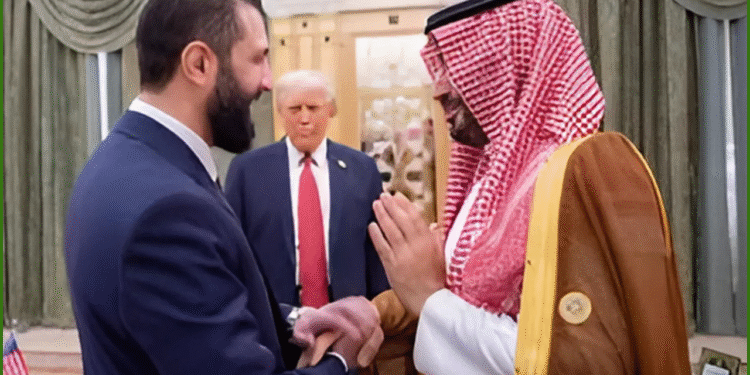RIYADH, May 18, 2025 — A striking image from this week’s diplomatic whirlwind in the Gulf underscored the growing isolation of Israeli Prime Minister Benjamin Netanyahu: U.S. President Donald Trump warmly greeting Syria’s new leader, Ahmed al-Sharaa, in Riyadh, a figure Israel has long labeled a terrorist. The meeting, part of Trump’s high-profile four-day tour through Saudi Arabia, Qatar, and the United Arab Emirates, signaled a shift in Middle East dynamics, with Israel increasingly sidelined.
Trump’s tour was more than a display of diplomatic flair; it marked the rise of a Sunni-led regional order, driven by Gulf monarchies and backed by billions in U.S. deals for arms, technology, and infrastructure. “We’re building a stronger, more prosperous Middle East,” Trump declared in Doha, announcing investment commitments exceeding $1 trillion. The agreements included a $150 billion arms package with Saudi Arabia and technology partnerships in the UAE, aimed at countering Iran’s influence.
For Netanyahu, the tour was a stark reminder of strained ties with Washington. Sources close to the Trump administration expressed frustration with Israel’s refusal to pursue a Gaza ceasefire, now in its 19th month with a death toll surpassing 53,000, according to Gaza health officials. The conflict, sparked by Hamas’ October 2023 attack that killed 1,200 and took 250 hostages, has drawn global condemnation for its humanitarian toll. Netanyahu’s rejection of ceasefire proposals and his opposition to U.S.-Iran nuclear talks have further irritated Washington.
“Netanyahu’s not delivering results, and that’s a problem for a deal-focused administration,” said a Western diplomatic source. While the U.S. remains a steadfast ally of Israel, Trump’s pragmatic approach prioritizes American interests, particularly economic and security ties with Gulf states. His decision to bypass Israel during the tour—a rare move for a U.S. president—sent a clear message, analysts say.
In Qatar, Trump praised the Gulf state’s role in hostage negotiations, despite Israel’s view of Doha as a Hamas financier. Qatar, home to a major U.S. military base, secured deals for Boeing aircraft and AI technology, reinforcing its strategic importance. Similarly, Trump’s surprise announcement lifting sanctions on Syria, at Saudi Arabia’s urging, highlighted the Gulf’s growing influence over U.S. policy—a move Israel opposed.
The tour also dimmed prospects for expanding the Abraham Accords, which normalized ties between Israel and several Arab states. Saudi Arabia, a key target for inclusion, reiterated that normalization depends on a Gaza ceasefire and progress toward Palestinian statehood—conditions Netanyahu rejects. “He’s got no plan for Gaza’s future,” said a regional analyst. “That’s stalling everything.”
In Israel, the government has remained silent, but public concern is mounting. “The region is reshaping, and we’re being left behind,” wrote a prominent Israeli commentator in Haaretz. Opposition leaders have accused Netanyahu of mismanaging ties with the U.S., with former Prime Minister Naftali Bennett warning of a “strategic crisis” on social media.
Trump, in a Fox News interview, downplayed any rift, calling Netanyahu a “friend” facing “tough choices.” Yet his actions suggest a recalibration. By embracing Gulf-led initiatives and engaging with Syria’s new leadership, Trump is forging a Middle East less dependent on Israel’s priorities. Iran, weakened by losses to its proxies in Lebanon and Gaza, is no longer the region’s dominant force, but Israel’s influence appears to be waning too.
As Trump returned to Washington, Israeli strikes intensified in Gaza, killing dozens in a fresh offensive. The escalation, coupled with Netanyahu’s ongoing corruption trial and war crimes charges from the International Criminal Court, deepens his isolation. For now, the Gulf’s oil wealth and strategic clout are steering the region’s future, with Trump’s blessing—and Israel is struggling to keep pace.
“

















































